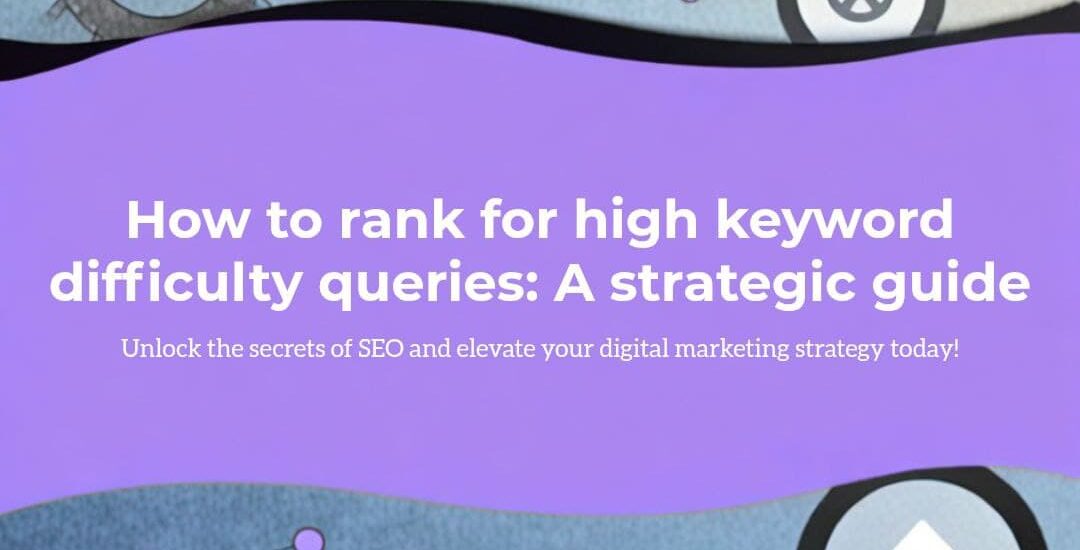With SEOXCELERATE’s Tested Framework to Dominate Competitive SERPs
Ranking for high-difficulty keywords is the Holy Grail of SEO. These are the terms that everyone desires—high volume, high intent, and high commercial value. But they’re also highly contested, usually dominated by established brands with deep pockets and authority.
If you’re looking to crack into these number one positions, you require more than standard on-page optimization. You require a thoughtful, multi-layered approach.
At SEOXCELERATE, we work with brands to claim rankings for highly competitive keywords—even in saturated markets. This eBook will guide you through actionable, step-by-step methods that are more than textbook SEO to provide you with real-world results.
What Are High Keyword Difficulty Queries?
High-difficulty (in short-form as KD) keywords are search queries with:
High search volume (thousands to millions per month)
High commercial intent (buying, comparison, service-based)
Several authoritative domains already ranking
High-quality, optimized content on Page 1
Examples:
“Best CRM software”
“Buy gold online”
“Personal loan in India”
These are not the type of searches you can rank for overnight. But with the right strategy, you can whittle away at competitors and earn your place.
Why Ranking for Hard Keywords is Important
High ROI: They tend to have higher conversion rates.
Brand Credibility: Consumers trust web pages that appear on Page 1 for their most important queries.
Compounding Traffic: After you rank, you receive steady, passive traffic.
Here at SEOXCELERATE, we don’t think even the toughest keywords are beyond our reach, and we believe they can be addressed with a layered, persistent approach.
SEOXCELERATE’s 6-Step Approach to High-Difficulty Keywords
- Deep Intent Analysis: Don’t Look Just at the Keyword
Don’t just examine the keyword—you need to know why users are looking for it.
Is it informational or transactional?
Are they searching for reviews, comparisons, tutorials, or vendors?
What pain point is the search query alleviating?
How to Do It:
Assess the top 10 SERP pages.
Utilize tools such as Semrush, Ahrefs, or Google’s own “People Also Ask.”
Pay attention to the types of content that rank (listicles, landing pages, how-tos).
SEOXCELERATE Insight:
We develop content outlines optimized around search intent, making our pages align (and surpass) what Google rewards.
- Build Authority with Topic Clusters
You can’t rank for highly competitive keyword with a single page.
Google likes topical authority: showing expertise in a whole topic.
Strategy:
Design a pillar page for the main keyword.
Develop cluster content for related long-tail questions.
Strategically interlink them.
Example:
Main Topic: “Best Project Management Software”
Clusters:
“Project management software for small businesses”
“Trello vs Asana comparison”
“How to choose project management tools”
SEOXCELERATE Strategy:
We organize these clusters within a content calendar, internal linking to build the pillar page’s ranking authority.
- Optimize for User Experience and Engagement
Google is interested in behavioral signals such as bounce rate, dwell time, and click-through rate (CTR).
Optimization Tips:
Write compelling, descriptive titles and meta descriptions.
Use inviting introductions that deliver value promises.
Break up content with subheadings, bullet points, and images.
Optimize page speed and mobile usability.
Include interactive elements: calculators, quizzes, infographics.
SEOXCELERATE Insight:
We test A/B headlines and CTAs to maximize click-throughs and on-page activity.
- Produce the Best Content on the Internet for That Topic
Good isn’t good enough for competitive keywords. Your content needs to be the best accessible resource.
Checklist:
Is it more in-depth than competitors?
Is it current with new data and trends?
Does it incorporate original research or insights?
Are the visuals custom-designed?
Is it concise and easy to read?
SEOXCELERATE’s Process:
We employ the Skyscraper Technique—identifying the best-performing content and building upon it even better.
- Strategic Link-Building Campaigns
High-KD keywords require powerful backlinks. But that is not a reason to buy spammy links or hope for luck.
Our Link-Building Tactics:
Digital PR: Pitch news-worthy content to reporters.
Guest Posts: On authoritative industry blogs.
Linkable Assets: Infographics, studies, calculators.
HARO (Help a Reporter Out): Get media citations.
Competitor Backlink Analysis: Identify gaps and duplicate.
SEOXCELERATE Service:
We handle end-to-end outreach campaigns, such that backlinks are from authoritative, relevant domains.
- Ongoing Monitoring and Optimization
SEO is not set-it-and-forget-it, particularly for high-difficulty keywords.
Key Steps:
Track keyword ranks on a weekly basis.
Utilize heatmaps to monitor user engagement.
Monitor competitor updates.
Update content every 6-12 months.
Establish new backlinks over time.
SEOXCELERATE Insight:
We give clients live dashboards and monthly strategy calls to tighten up and adjust according to data.
Common Pitfalls When Going After High-Difficulty Keywords
Attempting to rank with thin or generic content.
Overlooking search intent and user experience.
Forgetting about internal linking.
Underestimating backlinks’ value.
Quitting too soon—it may take 6–12 months (or more) for huge wins.
Real-Life SEOXCELERATE Example
Client: SaaS CRM Startup
Keyword: “Best CRM for Small Business” (High KD)
Our Strategy:
Developed topic cluster with 10+ supporting articles.
Produced comparison tables and original research.
Got 20+ quality backlinks from business blogs.
Mobile and page speed optimized.
Outcome:
Ranking on Page 1 within 8 months.
300% growth in organic signups through organic search.
Conclusion
Ranking for difficult keywords isn’t not possible—it just takes strategy, patience, and relentless implementation.
With an understanding of search intent, topic authority, delivering great content, acquiring powerful backlinks, and ongoing optimization, you can beat out even the largest players in your industry.
At SEOXCELERATE, we expertly walk brands through this very process—transforming high-difficulty aspirations into Page 1 achievements.
FAQs
Q1: How many months does ranking for a high-difficulty keyword take?
Typically 6–12 months, but depending on competition, domain authority, and link effort.
Q2: Do I have to spend a ginormous budget on this?
Helps, but clever strategy and effective resource use can beat bigger budgets.
Q3: Can I use PPC instead?
Yes, but it’s expensive for high-value keywords. SEO provides compounded, long-term ROI.
Q4: Do I only target high-difficulty keywords?
No. Include low and medium-difficulty terms in your strategy to establish authority and traffic in a hurry.
Q5: Can SEOXCELERATE assist with my strategy?
Absolutely. We provide in-depth SEO audits, content strategy, link-building, and managed SEO services customized to your objectives.







